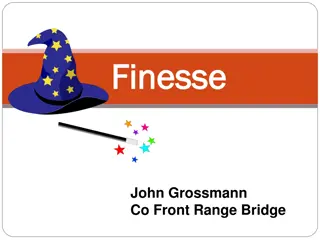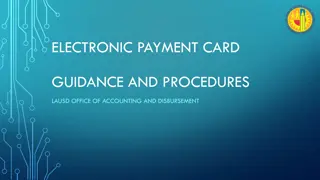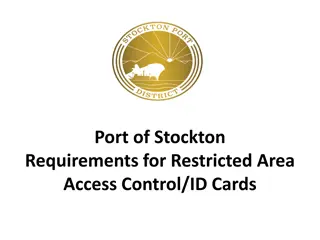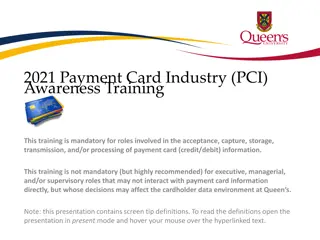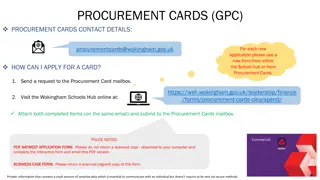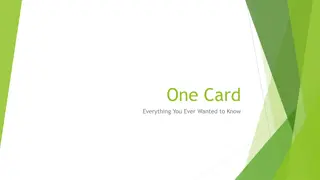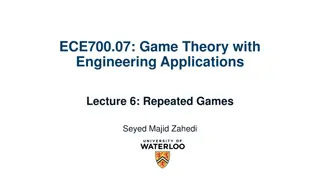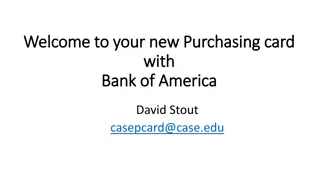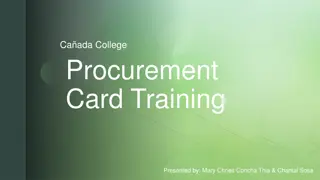Fun Card Games to Play at Home
Explore these engaging card games you can play at home with family and friends such as Tens Go Fish, Elevenses, Add Up Your Cards, Double and Near Double Snap, and I Spy. These games offer entertainment while also helping to build skills like math fluency, observation, and strategy. Enjoy hours of fun with these different card game options!
Download Presentation

Please find below an Image/Link to download the presentation.
The content on the website is provided AS IS for your information and personal use only. It may not be sold, licensed, or shared on other websites without obtaining consent from the author.If you encounter any issues during the download, it is possible that the publisher has removed the file from their server.
You are allowed to download the files provided on this website for personal or commercial use, subject to the condition that they are used lawfully. All files are the property of their respective owners.
The content on the website is provided AS IS for your information and personal use only. It may not be sold, licensed, or shared on other websites without obtaining consent from the author.
E N D
Presentation Transcript
Tens Go Fish This game is exactly like Go Fish except you are pairing cards that make ten. https://3.bp.blogspot.com/-jo11LcGlt2o/W-CabFbzIzI/AAAAAAAAOwc/QwkDSDekEIkza27CPrkm6N7bblqqCcpCACEwYBhgL/s640/go%2Bfish.jpg "I have 2. Do you have an 8 to make 10?" This game is played with 2-4 players and is great to build fluency with pairs of 10.
Elevenses Deal out 9 playing cards like this: 23 6 2 28 Q 5 9 7 2 From your hand, collect any two cards that total 11. If you can t, you are allowed to collect up ANY three royal cards to get moving again. If you can t even do this you re bust! You must begin again! Can you play the whole hand?
Add up your cards! Take out picture cards. Deal out 5 cards to each player. Everyone must then race to total up their cards - whoever has the highest total is the winner. All the cards go back into the deck, ready to deal again. After a few rounds, you may wish to make the winner the person with the lowest total, or the person with the total closest to 30. You can decide! To level up - deal each player more cards. - include the picture cards so Jack = 11, Queen = 12, King = 13
Double and Near Double Snap Take out the jokers and picture cards (Jack, Queen, King) before you begin! 1. Begin by playing normal snap with a pack of cards. When a player gets a snap, they have to say SNAP and the sum of the 2 cards (3+3=6 or Double 3 equals 6). It is important that say the stem sentence. 2. When confident, move on to near doubles (e.g. 6+7=13) They say NEAR DOUBLE and the sum of the two cards. Encourage children to use strategies such as 6+6+1=13. Can they spot when one comes up? How do they know if it is a near double?
I Spy This card game is for two players. You will need one deck of cards with the picture cards removed (40 cards remaining). Instructions 1.The cards are dealt face up in a 10x4 grid. 2.The first player challenges the other one to find two cards next to each other that add to make a particular number. The first player says, I spy with my little eye two cards that add to make ______. 3.The second player then looks for 2 cards that add to make the number. The two cards to be added need to be next to each other either horizontally or vertically. The player then picks the cards up to add them to their pile. They do this with any other pairs that add to make the number as well. 4.If the second player misses any pairs that add to the number, then player one may claim them. 5.The players alternate taking turns and continue until all the cards are gone. 6.The winner is the player with the most cards at the end of the game. 7.As large gaps appear in the grid, move the cards closer together to fill those gaps. Challenge: to up level this game for KS2 children, do not just use adding! Instead you could try: I spy with my little eye two cards that have a difference of ______. I spy with my little eye two cards that have a product of______. I spy with my little eye two cards that are a multiple of ______.
Stop or Dare This is a game for two or three players. You will just need a pack of cards. Shuffle the pack deal it fairly between each player, placing the cards face down. Set a target score for the game, for example 50. The first player turns over the top card and continues turning over cards, adding together the value of each card, until they decide to stop. Jacks score 11 and Queens score 12. When the player stops, the total is recorded as their score. However, if an Ace or a King is turned over, no points are scored at all, and the turn is finished. The second player then starts turning over their cards in the same way. Players take turns until someone reaches the target score. This player is the winner. If the cards are all turned over before the target is reached, just reshuffle the pack and continue. Game found on https://nrich.maths.org/1193
Thirty One This game needs one pack of cards and two players How to Play Lay out the ace to six of each suit in a row, face up and not overlapping, one suit above another. You will have one column of four aces, a column of four twos, and so on. The first player flips a card upside down and says its number value. Players alternate, each time turning down one card, mentally adding its value to the running total, and saying the new sum out loud. The player who exactly reaches thirty-one wins. If you go over 31, you are bust!
30 More or Less This is a 2 player game. For this game you will need a whole deck of cards, with just the Kings and jokers removed. Aces are 1, Jacks are 11, and Queens are 12. One player is designated as "More than 30" and the other is "Less than 30". Each player gets half of the cards and then players flip over their top card. Multiply these cards together and if the product is below 30, the Less Than Thirty player keeps the cards. If it is greater than 30, the More Than Thirty player keeps it. If it is exactly 30, the cards are left in the middle and the next winner keeps those cards as well. Play continues until the cards run out and the player with the most cards wins.
Make 24 Remove all face cards from the deck. Aces are equal to 1. The object of the game is to arrange four cards and using the four basic mathematical operations (addition, subtraction, multiplication, and division) to get a total of 24. First, the dealer deals out four cards face-down to each player. When all the cards are dealt to each player, all of the players will turn their cards over face-up in front of them and try to arrange their cards in any order and use three of the four math operations to reach the total of 24. The first player that comes up with a total of 24 first is awarded a point. . If nobody comes up with a solution no points are given for that round. Whoever has the most points after a predetermined number of rounds wins the game.
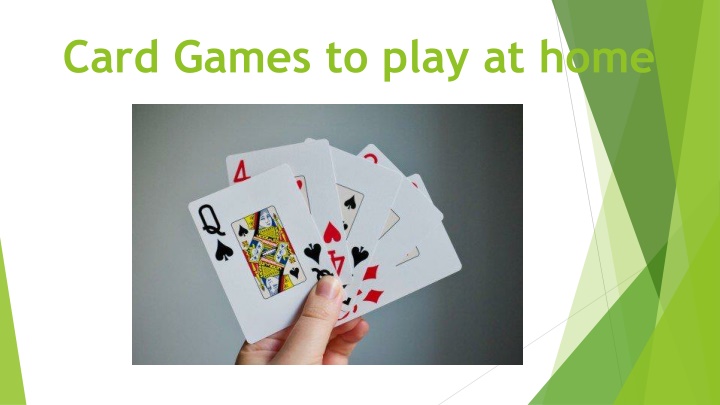



![Guardians of Collection Enhancing Your Trading Card Experience with the Explorer Sleeve Bundle [4-pack]](/thumb/3698/guardians-of-collection-enhancing-your-trading-card-experience-with-the-explorer-sleeve-bundle-4-pack.jpg)



